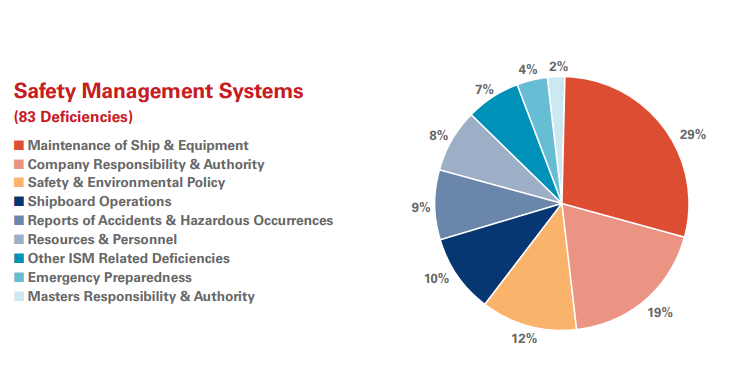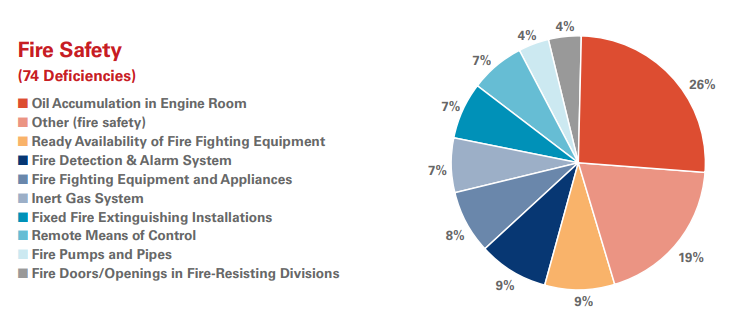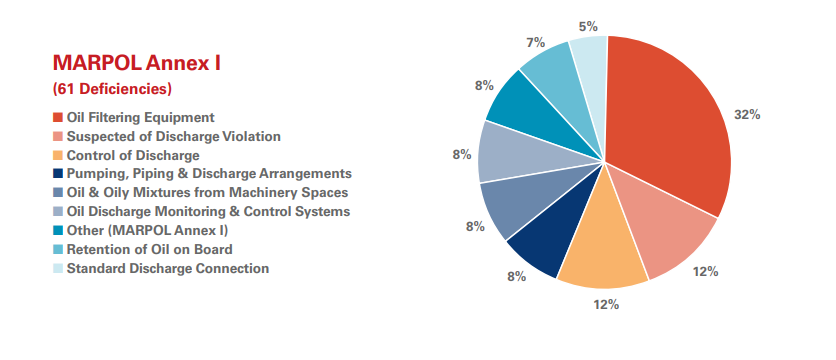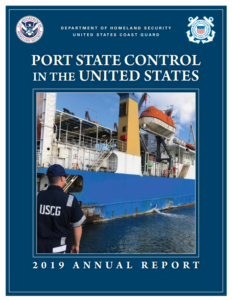The Coast Guard’s Office of Commercial Vessel Compliance announced the release of the US Port State Control Annual Report for 2019, presenting its key findings for the year that passed.
Vessel Arrivals Decreased with Exams Yielding Slight Detention Decrease
It is reported that in 2019 10,394 individual vessels, flying under 84 different flags, called made 83,231 port calls to the U.S. Thus, the USCG conducted 8,622 SOLAS safety exams and 8,619 ISPS exams on these vessels, less than the exams that they conducted in 2018. However, ship detentions concerning environmental protection and safety related deficiencies decreased from 103 to 97 with merit appeals undergoing the review process. The total number of ships detained in 2019 for security related deficiencies decreased from eight to seven.
Flag Administration Safety and Security Performance
The USCG removed the flags of Cyprus, Turkey and India from their Targeted Flag List.
The Flag administration safety performance for 2019 was stable, showing a slight decline from 1.14% to 1.12%.
Flag administration security performance for 2019 increased slightly resulting in the annual Control Action Ratio (CAR) decreasing from 0.09% to 0.08%. The three year rolling average CAR held steady at 0.08%. Additionally, for the fourth straight year, there were no flag administrations listed on our ISPS/MTSA targeted matrix
Detention and Association Appeals
The USCG received 39 appeals in 2019, from which 23 were submitted challenging the overall merits of the detention. For those merit appeals that have been finalized, six were granted, ten were denied, while for the time being seven merit appeals still under consideration.
Detainable Deficiencies Overview
As mentioned above, 2019 saw a decrease in the number of detentions from the previous year. Below is an overview of some detainable deficiencies found during PSC examinations in 2019.
- Safety Management Systems (SMS):
SMS deficiencies were the most cited during the PSC. The deficiencies included multiple uncorrected material, operational deficiencies, crew lack of implementing to the SMS which relates to the maintenance of the ship and equipment lead all stand-a-lone SMS related deficiencies.
Several SMS-related detentions resulted from failure to properly report non-conformities and take corrective actions.

- Fire Safety
The USCG identified 16 detainable deficiencies related to the accumulation of oil in the engine room. In addition, fuel leaks, oil soaked lagging, and excessive amounts of oil in the bilges were common observations identified by our PSCOs.
The USCG highlights that keeping firefighting equipment maintained and readily available should be a priority.

- MARPOL Annex I:
The year that passed, only a 9% of the detainable deficiences were MARPOL Annex I related. Deficiencies related to oil filtering equipment accounted for over 30% of the total Annex I deficiencies. The majority of the cases were about the oily water separators not being able to produce an effluent below 15ppm.
It is reminded that If PSCOs discover cases of bypassed OWS equipment or instances of falsified oil record books, criminal prosecution of the vessel and its crew by the U.S. Department of Justice may result.

- Lifesaving Appliances
Detainable deficiencies related to lifesaving systems have remained steady over the last three years accounting for less than 10% of the total. Deficiencies related to rescue boats and lifeboats lead the category this year, mostly due to not being ready for immediate use. In some cases, the engines could not be started and in others, there were problems related to the davits and falls. For 2019, they recorded two detainable deficiencies related to personal lifesaving equipment.
To learn more click herebelow































































